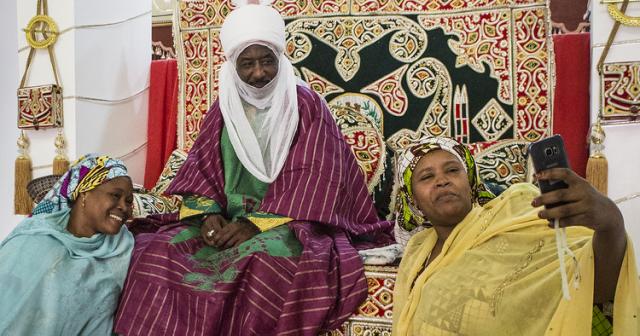The most powerful man in this ancient city rides through the streets on prized thoroughbreds and in vintage Rolls-Royce convertibles. One servant holds a designer umbrella over his head, no matter the weather. Another fans him with exotic-bird feathers. As soon as they see him, a group of uniformed men fire cannons into the air.
Muhammad Sanusi II is the emir of Kano. For 1,000 years, his predecessors ruled one of Africa’s great empires. Now, Sanusi has inherited his family’s palace, its pageantry and its nostalgia for a Nigeria that no longer exists.
He is, by some measures, the most important traditional leader in West Africa. But in a country of pop stars, oil tycoons and cutthroat politicians, his reign has become a litmus test for the relevance of Nigeria’s tribal and religious chiefs. Is the man on Kano’s velvet throne an expensive anachronism?

Versions of that question are being asked across Africa, as mayors and chief executive compete for power with tribal elders and paramount chiefs, as young people engage with their communities on Facebook as frequently as the ones in their native villages, and as booming cities draw more families from their ancestral homes.
Muhammad Sanusi II, surrounded by his guards and aides, rides one of his thoroughbred horses through the Old City in Kano to the Fatahul Mubin Islamic School for a graduation ceremony. (Jane Hahn/For The Washington Post)
Sanusi, 56, has taken on the question of his relevance with fervor, trying to show the ways the traditional and the modern can coexist in Nigeria. He’s the right man for the job: a former head of Nigeria’s Central Bank, a staunch opponent of child marriage, a man whose bookshelf is divided between Islamic law and monetary policy and whose iPhone is constantly lighting up.
“People have this idea of what an emir should be — he’s elderly, he’s quiet, he’s detached,” Sanusi said. “I’m from a different generation.”
In 2014, Boko Haram, perhaps the world’s most vehemently anti-modern Islamist extremist group, tried to kill Sanusi in an attack on Kano’s central mosque. He happened to be traveling that day. More than 100 others were killed. The assassination attempt underscored Sanusi’s prominence and the risks he was undertaking as a reformer. Sanusi has not let up.
A few times a week, Sanusi holds court in an annex of his palace, a cathedral-like chamber where he sits atop an ornate throne, resting on cushions embroidered with his name. Visitors bow before him on a red carpet, their foreheads touching the ground.
On one hand, the hearings are a theatrical display. Sanusi’s henchmen surround him whenever he adjusts his robe or hat so the public can’t see his movements. Another group of men sound 10-foot iron horns before he takes the throne. Until someone takes out a smartphone, Sanusi’s palace appears stuck in time, in the 19th century, or the 10th.
But as a line forms of people seeking Sanusi’s counsel, it’s clear that his role is more than ceremonial. There are divorce cases and property disputes and visits from government officials. During one recent session, Nigeria’s police chief arrived with his deputies, lining up in front of the throne. Sanusi lectured them about criminal justice reform, the man with no official power instructing the formal keepers of Africa’s wealthiest nation.
“It’s clear that many people trust him more than they trust the official legal system,” said Ibrahim Mukhtar, Kano’s attorney general, who had come to visit Sanusi.
“We need to recognize that.”

That duality exists across much of the continent. In rural Malawi, the punishment for theft is meted out by the village head, not the judicial system. (The penalty is typically two hens.) During the Ebola outbreak in Sierra Leone, it was paramount chiefs, not formal government representatives, who often persuaded people to change their behavior and ended the epidemic.
But Sanusi’s stage is much bigger than that of most traditional leaders. Kano state now has a population of nearly 10 million. And the emir’s comments and actions have typically resonated across much of West Africa.
Remaining relevant, and proving his modernity, has come at a price. Sanusi is a public critic of men who marry more than one wife when they can’t afford to support multiple families. He is a proponent of contraception and an advocate for women earning university degrees before they are married. In Kano’s conservative Islamic community, those positions haven’t gone over well.
“Many saw him tilting the balance toward a pro-Western agenda here, and that created problems,” said Tijani Nanyia, a history professor at Kano’s Maitama Sule University.
Photos by Jane Hahn
.Washingtonpost














